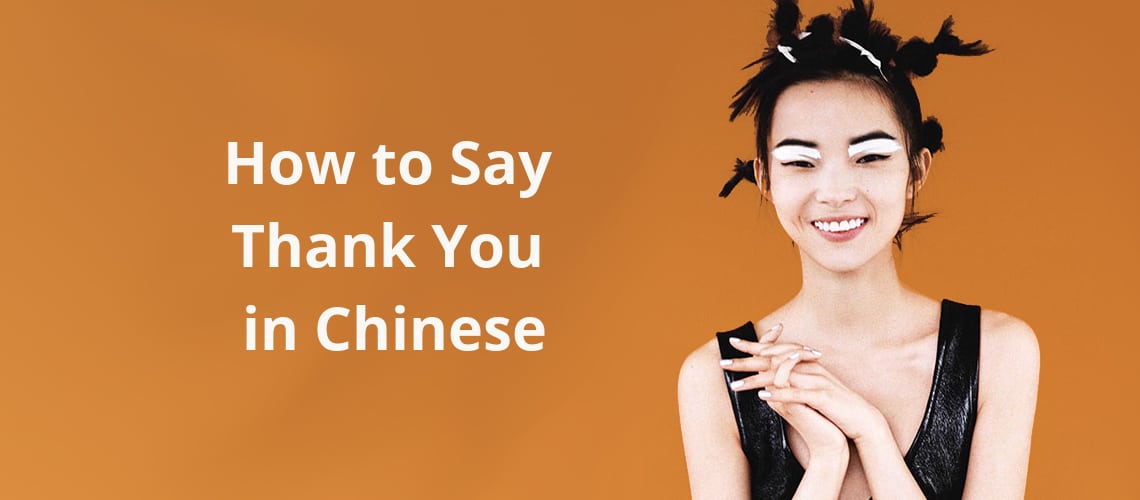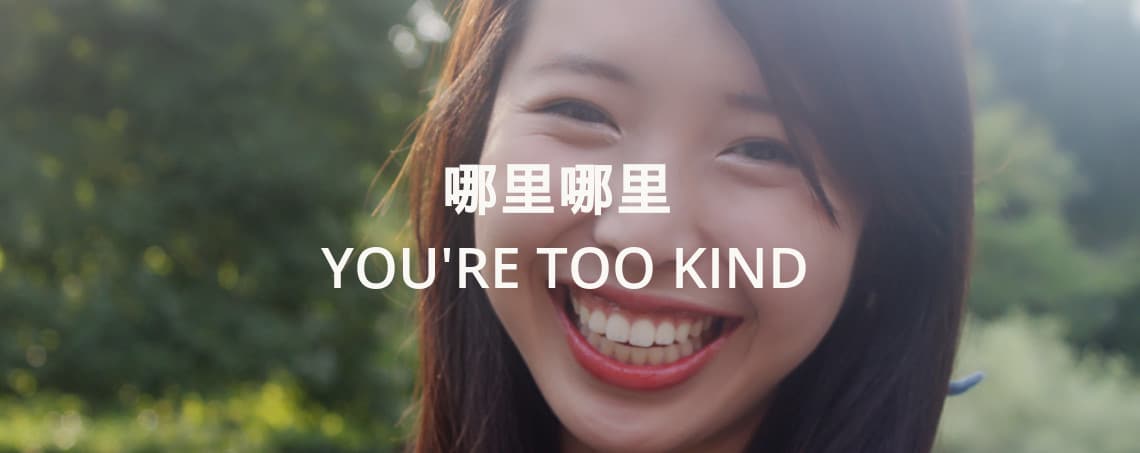Saying thank you in Chinese is as essential as saying hello in everyday life and is a must-know in your Survival Chinese toolkit. Whether you’re traveling to China or living in China, thank you in Chinese is a basic word you’ll find yourself using all the time.
As you know, being polite and thankful towards people will always bring you good things, especially if you make the effort to say them in their native language. Try these expressions to see!

谢谢 is one of the first words to learn in Chinese to say thank you. But did you know there are many more expressions to say thank you in Chinese? Let’s start with the basic ways to say thank you in Chinese and introduce 3 more ways to thank you in Chinese to you.
#1 Thank you in Chinese: 谢谢 – Thank you
Let’s start from the beginning. 谢谢 xiè xie thank you is the most used word to thank someone in Chinese.
As you can see, 谢谢 is a double syllable word. It can seem a bit hard to pronounce. To help you through your Chinese learning adventure, here’s a Nincha tip to say it like a native: think of a sound between /s/ and /sh/. You got it? Great, that’s how you should pronounce the “x” in 谢谢 (xiè xie) .
Try to say xiè xie now. Pay attention to the fact there’s a the neutral tone on the second syllable and your thank you in Chinese will be perfect.
You can also learn the word 谢谢 in Ninchanese if you have a look in the world 1.
When receiving food, gifts or anything else you’re feeling thankful for, you can definitely say 谢谢. Here’s an example:
我买了巧克力给你 Wǒ mǎile qiǎokèlì gěi nǐ I bought chocolate for you
谢谢 xiè xie thank you
It’s good to know that the Chinese don’t use 谢谢 as much as some other cultures do. That’s why you might not always hear them saying thanks. Don’t think it’s because they’re being impolite, it’s a cultural thing.
In China, people can feel uncomfortable when saying thank you because it puts distance between the speaker and the recipient, and that’s not something they want to do, especially if they’re close. Chinese people just don’t want to put distance between each other. Shortening social distance is their way of being polite .
Bonus uses of 谢谢:
If you’re texting or messaging someone and want to thank them, you can also use
duōxiè thanks a lot.
多谢 is mostly used in writing. But nowadays, people sometimes use it when speaking as well.
When meeting someone for the first time, talking to someone higher-ranked or older than you then you certainly want to be more formal when thanking them.
You can use 谢谢你 xiè xie nǐ thank you to be a little more formal but when talking someone hierarchically higher than you, it’s better to say 谢谢您 xiè xienín as 您 is the formal form of 你.
When someone offers you an awesome gift you can tell them:
谢谢你的礼物! Xièxie nǐ de lǐwù! Thank you for your gift!
🏮 Ninchanese is an incredible app for learning Chinese! 🏮
” I actually graduated from the University of Edinburgh with a MA in Chinese.
I’ve used Ninchanese daily, and it has helped me a lot! “
– Connor, Ninchanese User
Try Ninchanese, an award-winning method to learn Chinese today:
Start Learning Now
#2 Thank you in Chinese: 非常感谢你 – Thank you very much
Sometimes in life you’re truly grateful. ”感谢” ”gǎnxiè” ”to is a great verb to use for those times. It emphasizes on the emotions, the feeling you’re going through.
When someone has been very nice with you and you feel like you owe them something then you can express your feelings of gratitude by saying:
非常感谢你 fēi cháng gǎn xiè nǐ thank you very much.
Be careful, though, this sentence is formal, so don’t use it when receiving a present or food, for instance. Save for times when you’re feeling extremely grateful.
Here’s when you can use this expression, for example. Imagine a situation in which you have to take the train and are very late – I can feel your pain – and someone you don’t even know helps you get to the train station by calling and paying a taxi for you to make sure you make your train. This is what you must tell them:
非常感谢你的帮助 Fēicháng gǎnxiè nǐ de bāngzhù Thank you very much for your help
You’ll see a big smile on their face!
#3 Thank you in Chinese: 感激 – To be grateful
Another word used to say thank you in Chinese is 感激 gǎnjī to be grateful. It expresses a deeper gratitude than 谢谢 and 感谢. You use 感激 when you are grateful. If someone has helped you when you were at the end of your rope, for instance, you can tell them:
当我消沉的时候,你鼓励了我。对此我十分感激。 Dāng wǒ xiāochén de shíhòu, nǐ gǔlìle wǒ. Duì cǐ wǒ shífēn gǎnjī. I really appreciate that you helped lift my spirits when I was feeling low.

#4 Thank you in Chinese: 哪里哪里 – You’re too kind
The expression 哪里哪里 nǎlǐ nǎlǐ you’re too kind is something you can also use to say thank you in Chinese, but only when you are praised by the others. When Chinese people are being paid compliments, they tend to prefer to show humility and modesty.
So, they avoid saying thank you which might be seen as too direct and which would make them seem too confident. Therefore, instead of using 谢谢 to acknowledge the compliment, the Chinese would rather say 哪里哪里 to deflect the compliment (while secretly enjoying the praise).
For example:
If someone says:
你很漂亮 Nǐ hěn piàoliang You’re beautiful
A native would answer:
哪里哪里 nǎlǐ nǎlǐ you’re too kind
Now that you know how to thank people, when to thank someone and how to show your gratitude in every situation, you can easily immerse yourself in the Chinese society. +1 for your basic Chinese survival skills! But what if someone says thank you in Chinese to you? What can you answer them?
Bonus: 3 ways to say “You’re welcome”
– 不客气 bù kèqì you’re welcome is, as you can guess, the most used expression. It fits nearly every situation.
– 不用谢 bú yòng xiè don’t mention it. You can easily replace 不客气 with this expression. For instance, if you give someone something and they answer 谢谢, you can reply: 不用谢. You can even say ”不用客气” ”bú
– 小事一桩 xiǎo shì yī zhuāng it’s nothing. Watch out for this one, however, as it tends to be more informal. So you can use it with friends, family but certainly not your boss 😉
As you see, there are many ways to show you’re thankful in Chinese. Saying thank you is not only about showing you’re polite, it’ also about fitting in society. Once you master the four expressions you just learned here, you’ll be able of showing your gratitude and know how to say thank you in Chinese. These expressions will be very useful to you on a daily basis, we’re sure!
The next step for you is to use it and see what you get in return. Lots of smiles I guess. 🙂
For more daily useful Chinese expressions, you can check out our posts about saying yes in Chinese and saying sorry in Chinese as well as this awesome guide to 20 survival phrases.
The Nincha Team
Stay in touch with us on Facebook, Twitter, Instagram, and Pinterest.





9 comments
Join the conversationPingback: Mandarin Weekly #64 – Mandarin Weekly (每周中文)
Pingback: 10 Different Ways of Saying Goodbye in Mandarin Chinese
Pingback: How to Teach Children to say “Thank You” with Heart | Fortune Cookie Mom 幸運曲奇媽咪
Pingback: My Homepage
Pingback: How to Teach Children to say "Thank You" with Heart - Fortune Cookie Mom
zane - September 11, 2018
love to learn Mandarin
Clarence Flamand - October 15, 2019
That was very interesting but the words should have been spelt phonetically to make it easier to learn Thank you
Pingback: How to Teach Children to say "Thank You" with Heart - Fortune Cookie Mom
Tipings - March 14, 2020
In India, people—especially when they are your elders, relatives, or close friends—tend to feel that by thanking them, you’re violating your intimacy with them and creating formality and distance that shouldn’t exist. One of the most jarring yet subtle aspects of my experience with Mandarin Chinese was the counterintuitive use—or lack of use—of thank you (
Comments are closed.